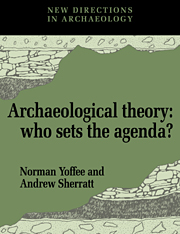Book contents
- Frontmatter
- Contents
- List of figures
- List of contributors
- Introduction: the sources of archaeological theory
- PART I THE SOCIAL CONTEXT OF ARCHAEOLOGICAL THEORY
- 1 Limits to a post–processual archaeology (or, The dangers of a new scholasticism)
- 2 A proliferation of new archaeologies: “Beyond objectivism and relativism”
- 3 Ambition, deference, discrepancy, consumption: the intellectual background to a post–processual archaeology
- PART II ARCHAEOLOGICAL THEORY FROM THE PALAEOLITHIC TO THE STATE
- PART III CASE STUDIES IN ARCHAEOLOGICAL THEORY AND PRACTICE
- PART IV EPILOGUE
- Index
2 - A proliferation of new archaeologies: “Beyond objectivism and relativism”
Published online by Cambridge University Press: 03 May 2010
- Frontmatter
- Contents
- List of figures
- List of contributors
- Introduction: the sources of archaeological theory
- PART I THE SOCIAL CONTEXT OF ARCHAEOLOGICAL THEORY
- 1 Limits to a post–processual archaeology (or, The dangers of a new scholasticism)
- 2 A proliferation of new archaeologies: “Beyond objectivism and relativism”
- 3 Ambition, deference, discrepancy, consumption: the intellectual background to a post–processual archaeology
- PART II ARCHAEOLOGICAL THEORY FROM THE PALAEOLITHIC TO THE STATE
- PART III CASE STUDIES IN ARCHAEOLOGICAL THEORY AND PRACTICE
- PART IV EPILOGUE
- Index
Summary
Skepticism about the archaeological past
Archaeologists have debated a remarkably consistent core of issues since the turn of the century. In 1913, for example, Roland B. Dixon inveighed against research that showed “too little indication of a reasoned formulation of definite problems” and an inexcusable “neglect of saner and more truly scientific methods” (1913: 563); “the time is past,” he insisted, “when our major interest was in the specimen … We are today concerned with the relations of things, with the whens and the whys and the hows” (1913: 565). The problems he recommended for archaeologists' consideration had to do with “the development of culture in general,” with what he described as cultural processes, and the scientific methods he recommended were explicitly those of hypothesis testing: archaeologists should proceed by formulating “a working hypothesis, or several hypotheses” and then seeking material that might fill available gaps and “prove or disprove” them (1913: 564). Four years later, Wissler advocated a very similar (problem–oriented, hypothesis–testing) program, and explicitly aligned it with anthropology; he described it as “the real, or new archaeology” (the article was entitled “The New Archaeology”).
- Type
- Chapter
- Information
- Archaeological TheoryWho Sets the Agenda?, pp. 20 - 26Publisher: Cambridge University PressPrint publication year: 1993
- 28
- Cited by



